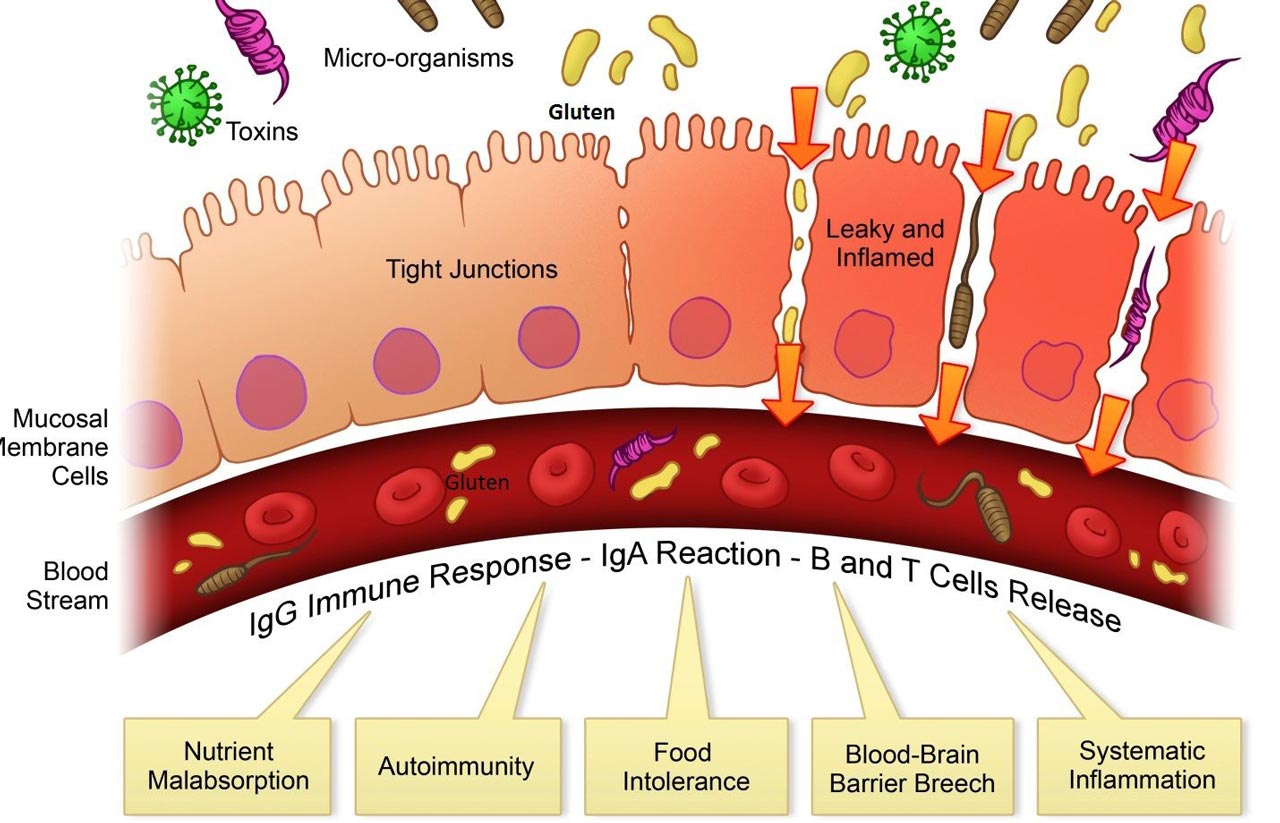
Can Leaky Gut Syndrome Cause Autoimmune Problems?
Impaired intestinal barrier function is commonly known as leaky gut. The intestinal cells have tight junctions holding them together to allow certain small molecules such as the nutrients from food to be absorbed. However normally the junctions prevent partially digested food particles, toxins and microbes form entering the blood stream. When this barrier is breached, leaky gut can occur and unfortunately this has been leaked with several conditions including autoimmunity.
So what causes leaky gut?
We are still trying to determine the exact causes of leaky gut, but here are some known factors.
1.Food
The number one culprit is gluten. Dr Alessio Fassano did pioneering research showing that gluten travels to the intestine and causes release of zonulin. This chemical causes the junctions between the intestinal cells to loosen creating leaky gut.
There may be other inflammatory foods that are unique to the individual that also create leaky gut and this needs to addressed to allow the lining to heal.
2. Gut Dysbiosis
An imbalance of gut microbes is called a dysbiosis. This can be bacterial, fungal or parasitic. A specific example of this is small intestinal bacterial overgrowth or SIBO where an excessive number of organisms either bacterial or fungal is found in the small intestine.

3. Toxins
Certain medications are known to cause leaky gut such as NSAIDS (non steroidal anti – inflammatory drugs), antibiotics and steroids. Also environmental toxins such as certain pesticides may be linked with leaky gut. Alcohol, which may not be commonly thought of as a toxin, is a known cause of leaky gut.
4. Stress
Both physical stress and psychological stress can contribute to a number of changes in normal gastrointestinal function including, changes in the microbiome, motility and intestinal permeability or leaky gut.
How does leaky gut lead to autoimmunity?
Autoimmunity is when your immune system begins to attack your own tissues. Depending on what tissue is attacked, will lead to a specific condition with its specific symptoms. For example, Hashimoto’s thyroiditis is when the thyroid is being attacked and rheumatoid arthritis is when the joint cartilage is being attacked.
For autoimmunity to occur, a person has to have the genes to make them susceptible, an environmental trigger to start the process and a leaky gut to allow the immune system to become dysfunctional.
As 80% of all our immune cells are found in the intestinal wall, having a leaky gut will allow toxins, bacteria or food particles to flood your bloodstream. The immune cells pay attention as their job is to remove and destroy the foreign invaders. Inflammation is created in an attempt to do just that. Unfortunately, this can begin to destroy healthy tissue as well. On top of that, your immune system starts making antibodies to the foreign invaders. In some cases, the foreign invaders look very similar to your own cells and so start attacking your own tissues. This process is called molecular mimicry.
What can be done about leaky gut?
There is still much research that needs to be done to better understand the role of leaky gut in disease and therefore the preferred treatment. Nevertheless, there are steps that can be taken to improve your gut health:
- Remove any known causes e.g. gluten, specific food allergies, alcohol, medication
- Eat a gut friendly diet to promote a healthy microbiome – limit sugar and include fermented foods and high fibre foods that act as prebiotics
- Use evidence based probiotics
- Provide the gut with nutrients that will enable the gut to repair itself e.g.
L-glutamine, collagen, N-acetyl glucosamine
Although leaky gut is still regarded as controversial, the evidence is growing to show that it is associated with certain diseases including autoimmunity. The good news is that steps can be taken to improve gut health and potentially prevent or reverse leaky gut.